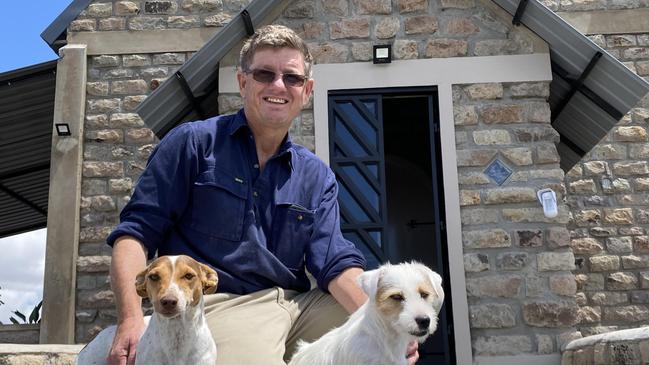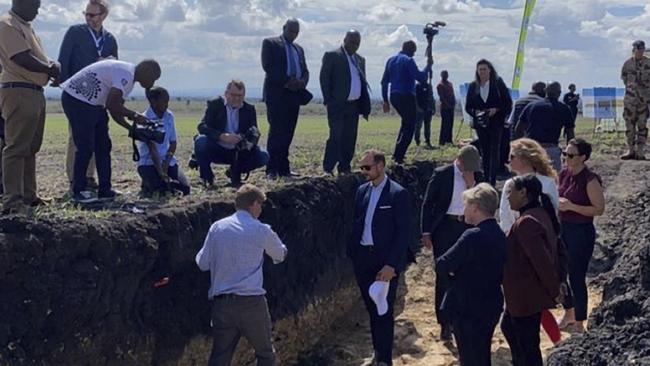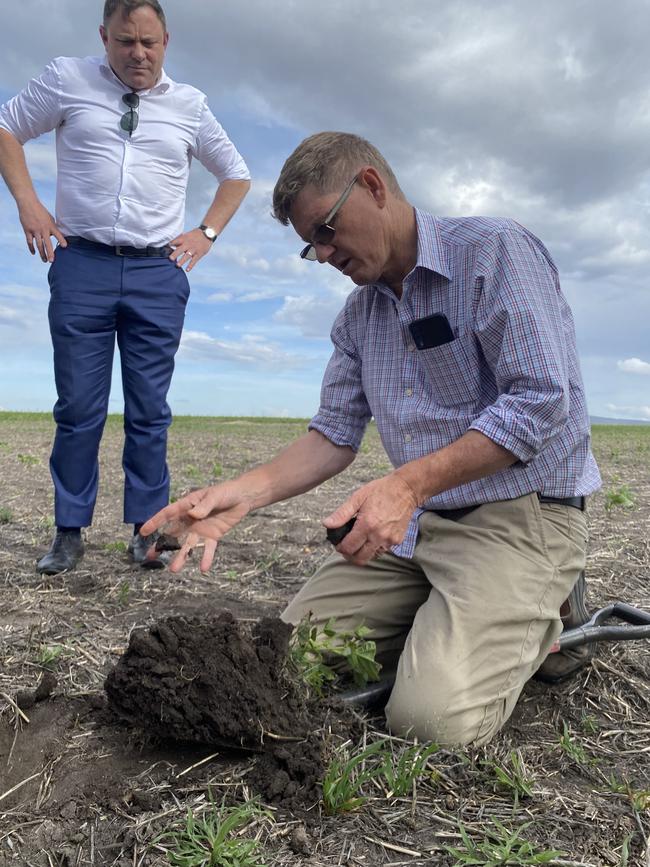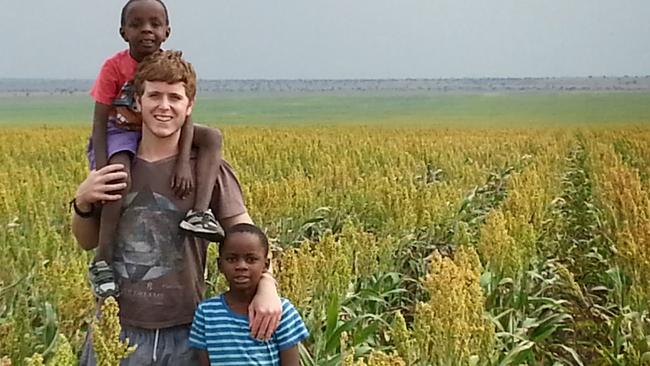Aussie farmer Stuart Barden’s mission to help Africa grow
Farmer Stuart Barden believed the best way to ease the food crisis in Kenya was using what he knew best – soil.

Australian farmer Stuart Barden and the crown prince of Norway are standing together inside a 1.5m hole, talking about dirt.
They’re on a large property outside the Kenyan capital, Nairobi, where Mr Barden has established a farm on the dry savanna plains – semi-arid land, with no dams or rivers, that nay-sayers feared could never be used for cropping.
Mr Barden, 52, is on a mission to improve the soil and increase its water-holding capacity, and Crown Prince Haakon, in Kenya leading a business delegation, is one of about 11,000 visitors who have come to the Ausquest farm at Athi River during the past decade to see the results of his success.
The crown prince – like seven Australian members of parliament who visited a week later – found himself deep inside a soil pit, head barely poking out of the hole as he examined the layers of soil.

“I actually found this land from a soil type map of Kenya,’’ Mr Barden said, looking around at the green paddocks on which he grows certified French bean seed for a company in The Netherlands and forage sorghum to make silage, which is sold to feed dairy and beef cattle.
“I was looking for low rainfall, black soil. We actually had other places offered to us but they were higher rainfall and we purposely wanted to come to a place with lower rainfall so we could show how much value there was in this lower rainfall area.”
A drive down the gravel lanes on the Barden farm is like an unofficial safari – giraffes amble past on the conservancy next door, a pair of silver-backed jackals bask in the sun, four ostriches ruffle their feathers and zebras shoot out in front of the four-wheel-drive. Mr Barden is tolerating the animals grazing on his land for the moment because the farm is out of season and the animals are struggling in the drought sweeping across the Horn of Arica.
“Normally I’d be very particular, they wouldn’t be in there,” he said. “There’s literally hundreds of animals that have died within 2km of here because of the dry. It’s a very unusual season and because it’s so dry I haven’t been that fanatical about a few wildlife.
“At the moment I haven’t been running the electric fences because I wanted to give them an opportunity … to just keep them alive if they can find some residues they can eat.”
Mr Barden, his wife, Annie, and their two youngest children – James, then 16, and Gracie, then 13 – arrived in Kenya in 2012, four years after Mr Barden first visited on a Nuffield scholarship and decided he wanted to farm there.
Oldest daughter Hannah stayed in Australia to finish university and visited when she could, while the two younger children went to school in Nairobi.
Mr Barden had grown up on the land outside Gilgandra in NSW, one of four children, and struck out on his own as a teenager when his father told the kids the family farm wasn’t big enough for all of them so they’d have to go and find their own land.
“It was the best thing Dad could have done because he just told us the truth straight up,” Mr Barden said.
He went wool-classing in Western Australia as a 17-year-old, and at 19 returned to NSW, where he started a mobile sheep crutching business and share farming. He met Annie Lamont, a Perth schoolteacher who was working in Esperance in WA, and they married four years later.
By the time Mr Barden was 38, the couple owned, leased or was sharefarming across 12,000ha in Warren, Condobolin and Gilgandra. It was a successful business, but Mr Barden was restless.
“I was already a bit frustrated, I guess I was running out of purpose,” he said. “By the time I was 38 I was like, this is not enough. What next? Growing 30,000 acres, growing 100,000 acres? Big deal.
“I guess I realised my ladder wasn’t leaning up against the right wall at that point. I realised I wasn’t looking for money, although I am very commercially minded. I guess I had a revelation that dollars aren’t the only currency in the world.”

A self-described born-again Christian, Mr Barden believed the best way he could honour God would be to try to do his bit to ease the food crisis in Kenya. He would embark on the mission using what he knew best – soil, and how to get the most out of it. He would try to teach others what he’d learned along the way about crop rotation and choosing the right crops.
The Bardens sold their Australian businesses and approached the man who owned the land Mr Barden had identified, David Hopcraft, a well-known figure in Kenya who had once farmed wildlife for meat but had turned his ranch into a conservancy.
“Because we’re essentially conservation farmers and because of what we wanted to do, the owner of the conservancy … very courageously in a way – backed us in terms of the land,” Mr Barden said.
Mr Hopcraft sold them 510ha of his conservancy and leased them another 699ha.
They poured every cent they had from Australia into setting up their new farm in 2012. Then they almost went under in their first year when they planted a grain sorghum crop. Their farm was invaded by an estimated seven million red-billed weavers, or qualea. “They’re a plague bird and they’re all in Africa and I think at one point they were all on our farm,” Mr Barden recalled.
The birds, sometimes known as feathered locusts, also cleaned them out the next year. The Bardens wondered how they could survive.
“They’re like the wildebeest of the sky,” Mr Barden said of the tiny birds, which still have nests in trees on his property.
“We started with grain sorghum thinking it was agronomically a very safe option. Ironically it ended up being an incredibly risky option.” The birds moved on when the Bardens stopped planting grain sorghum.
While Mr Barden was clear in his destiny, his family didn’t share quite the same enthusiasm for his mission. “Our whole family was sceptical,” he said.
“The problem is it’s my vision, if you like. Mine and Annie’s, but Annie has been a really gracious comer-alonger. It’s not really what she wanted to do. It’s not really her ideal to move to Africa. And while it was my idea, that weight is tremendous because it hasn’t been at zero cost for our family.
“I’ve made a lot of mistakes.”
Mr Barden had never built anything in his life before he moved to Kenya, but now he tries his hand at anything. Six years ago he worked with his neighbours to build a stone chapel for daughter Hannah to be married in, with rock slabs hand-cut from the local quarry.
Last year he converted it into a three-bedroom house, where the family lives on a mezzanine floor up a flight of dodgy steps.
While Hannah, a grain trader, and Gracie, a precision agronomist, are working in Australia, son James, a carpenter, recently returned to Kenya and is working on the farm.

Nine years ago the family moved to adopt two local boys, Johnny and Wiz (short for Wisdom), who are now 15. The adoption process is still making its way through Kenyan bureaucracy, but the boys are studying at Ballarat Clarendon College in Victoria, so Mrs Barden lives with them in Australia during the school year and the family is reunited during school holidays.
The Bardens are legal guardians for the boys, who had been abandoned by their families within six months of each other and were being reared together in a children’s home.
“They had a very close connection, that’s why we couldn’t take one without the other,” Mr Barden said.
He is delighted to have son James back with him, but during the school year he often finds himself alone with just his dogs, Maggie, Billy and Harry, for company.
“It probably gets a bit isolating,” he said.
“I don’t have many peers. I’m surrounded by the conservancy and 5000 smallholders, and I do have some very wonderful friends a couple of hundred kilometres away and they’ve been tremendous support.
“But yeah, it is a bit isolating in the sense of a normal farming context.”
His faith sustains him and guides him, and keeps him focused on his mission in Kenya. In the new year he will establish a conservation think tank and education centre on his farm to provide training for Kenyan decision-makers and to try to build momentum for conservation farming techniques such as crop rotation.
“I’m under no illusion, the actual crops we grow mean nothing in the total scale of things in terms of production,” he said.
“What we’re about is using that to inspire and encourage people.
“Those 10, 15 million people, 20 million small farmers here in Kenya. If we can help those guys do better, then the multiplier is enormous.”






To join the conversation, please log in. Don't have an account? Register
Join the conversation, you are commenting as Logout